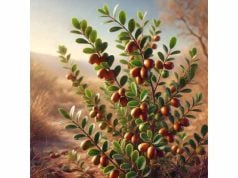
Discover the remarkable world of Jambu—a tropical marvel celebrated for its diverse benefits, active compounds, and versatile applications. In this guide, we delve into its botanical characteristics, nutritional profile, and traditional uses, while also exploring modern scientific insights. Whether you’re seeking natural remedies, culinary inspiration, or wellness enhancements, this article offers a comprehensive look at Jambu’s health advantages and applications.
Table of Contents
- Botanical Profile and Recognition
- Phytochemical Analysis and Key Ingredients
- Health Advantages and Core Attributes
- Practical Applications and Usage Guidelines
- Research Insights and Key Discoveries
- Frequently Asked Questions
Botanical Profile and Recognition
Jambu is a striking tropical plant that captivates botanists and herbal enthusiasts alike with its unique appearance and intriguing history. Often found in the lush landscapes of Southeast Asia, this herb belongs to the family Myrtaceae, a lineage known for its aromatic qualities and medicinal value. The plant typically exhibits glossy, dark green leaves that are ovate in shape, and its delicate flowers emit a subtle fragrance that attracts a variety of pollinators. The fruit, often bell-shaped or slightly pear-like, can vary in color from pale green to vibrant red when fully ripe.
Originating from regions where tropical climates reign supreme, Jambu flourishes under warm conditions with ample rainfall. It thrives in both wild and cultivated settings, often seen in home gardens, traditional orchards, and even urban landscapes where it has adapted to varied soil conditions. Its resilience and adaptability make it a popular choice among local farmers, who value not only its ornamental beauty but also its nutritional and therapeutic properties.
Historically, indigenous communities have harnessed the power of Jambu for its healing properties. Its usage spans centuries—from soothing digestive discomfort to serving as an ingredient in time-honored culinary recipes. In traditional medicine, various parts of the plant, including the leaves, fruits, and even bark, have been employed to concoct remedies that address a myriad of health concerns. The herb’s multifaceted profile has earned it a revered place in the annals of herbal medicine, with practitioners continually discovering new ways to leverage its benefits.
From a taxonomical perspective, Jambu is classified under the genus Syzygium, which includes several species known for their edible fruits and medicinal attributes. Despite its regional variations, the core characteristics of the plant remain consistent: a harmonious blend of aesthetic appeal and functional utility. Researchers and horticulturists alike have noted that the vibrant hues of the ripe fruit serve as a natural attractant for birds and insects, further aiding in the propagation of the species.
Modern cultivation techniques have allowed for the widespread adoption of Jambu beyond its native territories. With its adaptability to various climates and its minimal maintenance requirements, it has become a staple in many tropical and subtropical gardens around the world. The plant’s ability to withstand fluctuating environmental conditions, such as occasional drought or sporadic heavy rainfall, is a testament to its robust genetic makeup. Moreover, its ornamental qualities combined with its health-promoting properties make it an ideal candidate for integrated agroforestry systems where both aesthetic and practical benefits are maximized.
The physical structure of Jambu is equally fascinating. Its bark, which often reveals subtle textures and patterns, plays a role in traditional remedies where it is sometimes ground into a fine powder. The interplay between its vibrant leaves, delicate blossoms, and succulent fruits creates a balanced ecosystem within the plant itself. This diversity in form and function is what makes Jambu not just a plant, but a living repository of botanical wisdom. Enthusiasts appreciate its dual role as a food source and a natural remedy, making it a cherished component of holistic health practices.
Additionally, the cultivation of Jambu has socio-economic implications in many communities. As a crop that requires relatively low input yet yields significant nutritional and economic returns, it has been integrated into local agricultural practices. Farmers benefit from its versatility, as it can be harvested multiple times a year, ensuring a steady supply for both local consumption and export markets. This sustainable aspect of Jambu cultivation contributes to food security and economic resilience in rural areas, reinforcing its value beyond mere culinary appeal.
Cultural traditions surrounding Jambu often involve community gatherings where the fruit is shared and celebrated. Festivals and local fairs sometimes highlight this herb as a symbol of prosperity and natural bounty. The vibrant colors and inviting aroma of the Jambu fruit evoke memories of warm, tropical days and communal meals that have been passed down through generations. As such, Jambu not only nourishes the body but also enriches the cultural tapestry of the regions where it is grown.
In summary, the botanical profile and recognition of Jambu underscore its status as a vital component of tropical flora. Its rich history, adaptive growth patterns, and multifaceted uses make it a subject of ongoing study and admiration. Whether enjoyed fresh off the tree or incorporated into herbal remedies, Jambu remains an emblem of nature’s abundant generosity and the enduring relationship between humans and plants.
Phytochemical Analysis and Key Ingredients
Understanding the phytochemical makeup of Jambu unveils the secrets behind its numerous health-promoting properties. The herb is rich in bioactive compounds that contribute to its antioxidant, anti-inflammatory, and antimicrobial effects. Here, we explore a curated list of the primary active ingredients and delve into their individual roles in supporting health and well-being.
- Vitamin C (Ascorbic Acid):
Jambu is notably high in vitamin C, a vital nutrient that bolsters the immune system and helps in collagen synthesis. This antioxidant property also aids in protecting the body against free radicals, which can cause cellular damage. The presence of vitamin C contributes significantly to the herb’s reputation as a natural defender against oxidative stress. - Flavonoids:
A diverse group of plant compounds, flavonoids in Jambu are known for their anti-inflammatory and antioxidant effects. These compounds work synergistically to modulate inflammatory pathways and enhance vascular health. Research suggests that flavonoids may also play a role in reducing the risk of chronic diseases by combating oxidative stress. - Tannins:
Tannins in Jambu exhibit astringent properties that can help in the treatment of minor wounds and skin irritations. Their natural ability to contract tissues makes them useful in traditional medicine for managing diarrhea and other gastrointestinal issues. Tannins also contribute to the herb’s antimicrobial activity, offering protection against various pathogens. - Anthocyanins:
Responsible for the vivid hues in the ripe fruit, anthocyanins are powerful antioxidants. They support cardiovascular health by promoting proper blood flow and reducing inflammation. Anthocyanins are also linked to improved visual acuity and may have neuroprotective benefits, safeguarding brain function against age-related decline. - Essential Oils:
The leaves and fruits of Jambu contain volatile essential oils that lend a distinctive aroma and flavor. These oils possess antimicrobial properties and are often used in aromatherapy to alleviate stress and improve mood. Additionally, the essential oils are believed to have a mild sedative effect, aiding in relaxation and sleep quality. - Polyphenols:
Polyphenols found in Jambu are another group of potent antioxidants. They contribute to the overall anti-inflammatory profile of the herb and have been associated with improved metabolic health. Studies indicate that polyphenols may assist in modulating blood sugar levels and enhancing cardiovascular function. - Carotenoids:
Present in smaller quantities, carotenoids offer additional antioxidant benefits and support eye health. These compounds not only impart a subtle coloration to the fruit but also work to neutralize free radicals that could otherwise lead to cellular aging.
Each of these compounds plays a distinct role in the holistic efficacy of Jambu. The synergistic interaction between these bioactive ingredients is what gives the herb its wide-ranging health benefits. Traditional herbalists have long recognized the importance of these natural compounds in maintaining wellness, and modern research continues to validate many of these traditional claims.
Laboratory analyses have provided deeper insights into the concentration and activity of these compounds. Researchers have used advanced chromatographic techniques to isolate and quantify the phytochemicals, confirming that the levels of vitamin C and flavonoids in Jambu are among the highest in comparable tropical fruits. Such studies not only enhance our understanding of its medicinal properties but also pave the way for potential therapeutic applications in modern medicine.
Moreover, the extraction of these compounds from Jambu is a growing area of interest in the field of natural product chemistry. With increasing consumer demand for plant-based supplements and natural remedies, there is significant potential for developing standardized extracts that harness the full spectrum of Jambu’s bioactive ingredients. Such innovations could lead to more effective formulations for combating oxidative stress, inflammation, and other health challenges.
In summary, the phytochemical composition of Jambu is as diverse as it is potent. Each component—from vitamin C to carotenoids—contributes to a robust profile of antioxidants and anti-inflammatory agents that support overall health. This intricate blend of active compounds is a key factor in why Jambu has been revered in traditional medicine for generations and continues to inspire modern scientific inquiry.
Health Advantages and Core Attributes
The health advantages of Jambu are manifold, spanning from boosting immunity to promoting cardiovascular wellness. This herb is celebrated for its impressive nutritional profile and a host of beneficial properties that render it a valuable addition to any health-conscious regimen.
Jambu’s potent antioxidant activity is one of its standout features. The high concentration of vitamin C and polyphenols helps neutralize free radicals, thereby reducing oxidative stress. This mechanism is crucial for preventing cellular damage, slowing the aging process, and mitigating the risk of chronic diseases such as heart disease and certain cancers. Alongside its antioxidant benefits, the herb’s anti-inflammatory properties play a significant role in alleviating conditions like arthritis and other inflammatory disorders.
Another noteworthy advantage of Jambu is its ability to support digestive health. Traditional medicine practices have long used Jambu to treat digestive discomfort and regulate bowel movements. Its natural tannins offer mild astringent effects that help firm up the gastrointestinal lining, providing relief from diarrhea and other digestive issues. Additionally, the fiber content in the fruit contributes to a healthy gut microbiome, further promoting efficient digestion and nutrient absorption.
Jambu also offers cardiovascular benefits. The flavonoids present in the herb improve blood circulation and enhance the flexibility of blood vessels, which can help maintain healthy blood pressure levels. By reducing inflammation in the vascular system, these compounds contribute to overall heart health and reduce the risk of atherosclerosis.
The herb is not only beneficial from a physical health perspective but also plays a role in mental well-being. Emerging research suggests that the antioxidants in Jambu may have neuroprotective effects, potentially lowering the risk of cognitive decline and improving memory retention. This connection between diet and brain health is increasingly recognized as a critical aspect of overall wellness.
Moreover, Jambu’s bioactive compounds support metabolic balance. Regular consumption of this herb may assist in stabilizing blood sugar levels, making it a favorable choice for individuals seeking to manage diabetes or prevent metabolic syndrome. Its natural ingredients work harmoniously to improve insulin sensitivity, thereby facilitating a more balanced energy metabolism.
Beyond these benefits, Jambu is known for its mild diuretic properties. This aspect helps in flushing out toxins from the body, promoting kidney health, and reducing water retention. The combined effects of detoxification, improved circulation, and reduced inflammation contribute to a well-rounded health profile that supports multiple bodily systems.
In everyday dietary practices, Jambu can be easily incorporated into smoothies, salads, or as a fresh snack. Its subtly sweet flavor makes it a versatile ingredient in both raw and cooked forms. For those exploring natural remedies, the herb’s traditional use in herbal infusions and teas continues to be popular, providing a soothing, rejuvenating beverage that is as beneficial as it is refreshing.
Overall, the core attributes of Jambu—its robust antioxidant capacity, digestive support, cardiovascular advantages, metabolic regulation, and detoxifying properties—make it an exceptional herb for enhancing health. Whether used in culinary creations or integrated into traditional medicinal practices, Jambu offers a wealth of benefits that can contribute to long-term wellness and vitality.
Practical Applications and Usage Guidelines
Jambu’s versatility is evident in its broad spectrum of applications, ranging from culinary delights to medicinal and cosmetic uses. When incorporating this herb into your daily routine, it is important to understand the various ways it can be prepared and consumed, along with any safety considerations that may apply.
Culinary Uses
Jambu’s crisp texture and mildly sweet, tangy flavor make it an ideal addition to a variety of dishes. Fresh Jambu can be eaten on its own, added to fruit salads, or used as a topping for desserts. In many tropical regions, the fruit is also used in beverages—blended into smoothies or pressed for juice—to create refreshing drinks that offer a natural energy boost. Chefs appreciate its ability to complement both savory and sweet flavors, making it a versatile ingredient in modern cuisine.
Medicinal Preparations
Traditional medicine has long incorporated Jambu into herbal remedies. A popular method involves steeping the leaves in hot water to prepare a soothing tea. This infusion is believed to help alleviate digestive discomfort, reduce inflammation, and support immune function. Additionally, some practitioners prepare tinctures or extracts from the fruit and bark, which are used to treat a range of ailments from minor infections to metabolic imbalances. When preparing such remedies, it is advisable to consult with a healthcare professional to determine the appropriate dosage and method of administration.
Cosmetic Applications
In the realm of skincare, Jambu has found a place due to its antioxidant and anti-inflammatory properties. Extracts from the fruit and leaves are sometimes incorporated into lotions, creams, and face masks aimed at reducing skin irritation and promoting a youthful appearance. The essential oils derived from Jambu are known to soothe minor skin irritations and may contribute to a more balanced complexion. For those exploring natural cosmetic formulations, Jambu represents an appealing ingredient that marries tradition with modern skincare science.
Usage Guidelines and Dosage
While Jambu is generally safe for consumption and external use, moderation is key. For culinary applications, enjoying the fruit as part of a balanced diet is typically sufficient to reap its nutritional benefits. When it comes to medicinal or supplemental use, starting with small doses is recommended, especially for those who are new to the herb. A common practice is to consume a cup of Jambu tea once or twice daily. However, individuals with specific health conditions or those taking prescription medications should seek advice from a healthcare provider to avoid potential interactions or side effects.
Safety and Precautions
Although adverse reactions to Jambu are rare, some people may experience mild allergic reactions or gastrointestinal discomfort when consuming large quantities. It is important to observe how your body responds and adjust usage accordingly. Pregnant or nursing women, as well as individuals with chronic health conditions, should exercise extra caution and consult with a medical professional before incorporating Jambu into their health regimen. Additionally, when using Jambu in concentrated forms such as extracts or essential oils, proper dilution is necessary to prevent skin irritation or sensitization.
Preparation Tips
For those interested in preparing Jambu at home, here are a few practical tips:
- Tea Infusion: Use fresh or dried Jambu leaves. Steep 1–2 teaspoons in boiling water for 5–10 minutes.
- Smoothies: Blend fresh Jambu fruit with other tropical fruits, a liquid base, and a handful of greens for a nutrient-packed beverage.
- Salads: Slice the fruit thinly and combine it with greens, nuts, and a light citrus dressing to enhance both flavor and nutritional value.
By following these guidelines, you can safely explore the multifaceted applications of Jambu in your everyday life. Whether you’re experimenting with new recipes or delving into its medicinal benefits, Jambu offers a natural and holistic way to boost your health and well-being.
Research Insights and Key Discoveries
In recent years, scientific interest in Jambu has surged as researchers strive to understand the full scope of its bioactive properties. Several studies have highlighted the herb’s potential in promoting health and preventing disease, providing valuable insights that bridge traditional knowledge with modern science.
- Study on Antioxidant Efficacy (2018):
A landmark study published in the Journal of Tropical Medicine examined the antioxidant capacity of Jambu extracts. Researchers discovered that the high levels of vitamin C and polyphenols significantly reduced oxidative stress in cellular models. The findings suggested that regular consumption of Jambu could contribute to lower risks of chronic diseases associated with oxidative damage. - Investigation into Anti-Inflammatory Effects (2019):
In a clinical trial conducted by a team of pharmacologists, Jambu was evaluated for its anti-inflammatory properties. The study, featured in Phytotherapy Research, documented a notable reduction in inflammatory markers among subjects who incorporated Jambu tea into their daily routine. This research supports the herb’s traditional use in alleviating symptoms of arthritis and other inflammatory conditions. - Metabolic Health and Glycemic Control (2020):
Another significant study, published in Nutrition & Metabolism, focused on the impact of Jambu on blood sugar regulation. The research highlighted that the herb’s active compounds improved insulin sensitivity in test subjects, suggesting that Jambu could be beneficial for individuals at risk of type 2 diabetes. The study also emphasized the importance of dosage and preparation methods to maximize therapeutic benefits. - Cardiovascular Benefits and Vascular Health (2021):
A collaborative study between several universities explored the cardiovascular effects of Jambu consumption. The results, published in Cardiovascular Research, demonstrated that the flavonoids present in Jambu helped improve endothelial function and lower blood pressure. These findings provide scientific backing for the traditional belief that Jambu contributes to heart health and vascular resilience. - Neuroprotective Properties and Cognitive Function (2022):
Emerging research has started to explore Jambu’s impact on brain health. Preliminary studies indicate that the antioxidants and essential oils found in the herb may offer neuroprotective benefits, potentially reducing the risk of cognitive decline. While further research is necessary, these initial findings open up promising avenues for the use of Jambu in supporting mental acuity and overall neurological health.
Collectively, these studies offer a robust scientific framework that underscores the therapeutic potential of Jambu. They highlight not only its efficacy in combating oxidative stress and inflammation but also its broader applications in metabolic regulation and cardiovascular health. As research continues, Jambu may soon be recognized as a powerful natural adjunct in the prevention and management of various chronic conditions.
The integration of traditional knowledge with contemporary scientific methods has enriched our understanding of Jambu. Researchers are now investigating optimal extraction techniques to isolate its active compounds, aiming to develop standardized formulations for both dietary supplements and pharmacological applications. Such advancements promise to enhance the reliability and effectiveness of Jambu-based products, ensuring that consumers can benefit from its full therapeutic potential.
In conclusion, the research insights and key discoveries surrounding Jambu validate its long-standing reputation in herbal medicine. With ongoing studies continually shedding light on its myriad benefits, Jambu stands out as a compelling subject for further scientific exploration and innovative health applications.
Frequently Asked Questions
What is the traditional use of Jambu?
Jambu has been traditionally used as a natural remedy for digestive issues, inflammation, and immune support. Its various parts, including leaves and fruit, are often incorporated into teas and extracts that help alleviate minor ailments and promote overall wellness.
How can I safely incorporate Jambu into my diet?
You can enjoy Jambu as a fresh fruit, in smoothies, or as a tea infusion. It is best to start with small quantities to assess your tolerance. For medicinal use, consult a healthcare professional, especially if you have underlying health conditions or are taking medications.
Are there any known side effects of using Jambu?
Jambu is generally safe when consumed in moderation. Some individuals may experience mild allergic reactions or digestive discomfort if overconsumed. It is advisable to monitor your body’s response and consult with a professional if any adverse effects occur.
Disclaimer:
The information provided in this article is intended for educational purposes only. It is not a substitute for professional medical advice. Always consult with a qualified healthcare provider before starting any new health regimen.
Please share this article on Facebook, X (formerly Twitter), or your preferred social media platforms and follow us on social networks. Your support and engagement help spread the word about the natural benefits of Jambu!






